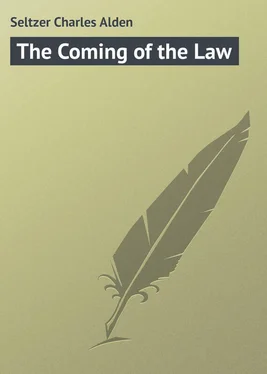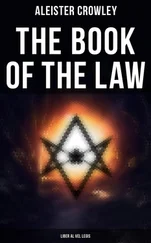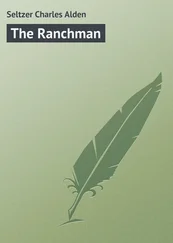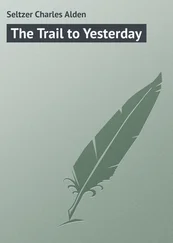Charles Seltzer - The Coming of the Law
Здесь есть возможность читать онлайн «Charles Seltzer - The Coming of the Law» — ознакомительный отрывок электронной книги совершенно бесплатно, а после прочтения отрывка купить полную версию. В некоторых случаях можно слушать аудио, скачать через торрент в формате fb2 и присутствует краткое содержание. Жанр: foreign_prose, foreign_adventure, на английском языке. Описание произведения, (предисловие) а так же отзывы посетителей доступны на портале библиотеки ЛибКат.
- Название:The Coming of the Law
- Автор:
- Жанр:
- Год:неизвестен
- ISBN:нет данных
- Рейтинг книги:5 / 5. Голосов: 1
-
Избранное:Добавить в избранное
- Отзывы:
-
Ваша оценка:
- 100
- 1
- 2
- 3
- 4
- 5
The Coming of the Law: краткое содержание, описание и аннотация
Предлагаем к чтению аннотацию, описание, краткое содержание или предисловие (зависит от того, что написал сам автор книги «The Coming of the Law»). Если вы не нашли необходимую информацию о книге — напишите в комментариях, мы постараемся отыскать её.
The Coming of the Law — читать онлайн ознакомительный отрывок
Ниже представлен текст книги, разбитый по страницам. Система сохранения места последней прочитанной страницы, позволяет с удобством читать онлайн бесплатно книгу «The Coming of the Law», без необходимости каждый раз заново искать на чём Вы остановились. Поставьте закладку, и сможете в любой момент перейти на страницу, на которой закончили чтение.
Интервал:
Закладка:
“As I have said your father altered his brand a good many times. But the Circle Bar cattle continued to disappear. Years of warfare followed. The Cattlemen’s Association lost no opportunity to harass your father or, for that matter, all the other small owners in the vicinity. Desperate, dissolute men were imported from Texas and Arizona, men who took delight in the shedding of human blood. These men roamed the ranges, stealing the Circle Bar cattle and killing Circle Bar cowboys. Your father had trouble in keeping men; in order to surround himself with enough men to protect his cattle and resist the aggressions of Dunlavey’s hired assassins he was forced to pay ruinous wages.
“Even then he could not prevent rustling. Dunlavey bribed his men; his herds dwindled; he saw that he was facing ruin if he did not devise some means to successfully cope with his enemies. He went over to Santa Fe to see the governor–a piffling carpet-bagger. He was told that the government was powerless; that the same condition existed all over the country, and that the government was unable to combat it. The Law had not come.
“Your father returned home, discouraged but not beaten. He approached the several other small owners in the vicinity, asking for co-operation and assistance. Fearful of Dunlavey’s wrath, the small owners refused to organize. But your father decided to carry on the fight alone. He recognized the fact that nothing but the Law could defeat the association’s aims, and he determined to force the Law into the Territory. With this end in view he established his newspaper. He succeeded in arousing public interest with the result that a court was established here.”
The judge smiled dryly, continuing: “Yes, the Law is here. Or what is more to the point, a representative of the Law is here. ‘I am the Law,’” he quoted, ironically. “But my hands are tied; this court is a mere travesty upon justice. The government at Washington has seen fit to send me here–alone. I can’t go out and get evidence; I couldn’t secure a conviction if I did. The people here who are not Dunlavey’s friends were afraid of him. I can’t get a jury. Dunlavey elects the sheriff–controls the election machinery. I am powerless–a mere figurehead. This is the situation in a nutshell. I could go into detail, but I imagine it is plain enough as it is.”
Hollis’s face had become gravely serious; his lips were straightened with an expression that hinted at the conflict that was going on in his mind.
“Isn’t there an army post near?” he questioned.
“Over at Fort Union–a hundred miles or so southwest. I have pleaded for a detail, but have been informed that it can’t be had; that the soldiers are needed to keep the Indians in order. Independent cattlemen are supposed to fight it out alone. At least that is the inference, if we are to consider the attitude of the government.”
Hollis was gravely silent. The judge leaned back in his chair, watching him with a queer expression. He realized that he had said enough to discourage the average young man from remaining in the country a moment longer than was absolutely necessary. He would not have been surprised had Hollis told him that he did not intend to remain. But from what he had seen of the young man he felt sure that his decision, when it did come, would be final. More than once since Hollis had been in the office had the judge observed the serene, steady gleam in his eyes, and he had catalogued him with the rare class of men whose mental balance is so perfect that nothing disturbs it. The judge had met a few such men in the West and he knew the type. As he sat looking at the young man he decided that Providence had made a mistake in allowing him to waste his time in the East. The West teemed with opportunities for men of his kind.
He was not surprised at Hollis’s next question; it showed that he was considering the situation from many angles before committing himself.
“What is the condition of Circle Bar ranch at present?” he asked.
“The title to the land is intact and cannot be assailed. But Norton informs me that there are not above two hundred head of cattle on the range, and that the buildings are run down. Not a very cheerful prospect?”
He had told the truth about the land and the cattle, but he had purposely exaggerated concerning the condition of the buildings, being grimly determined to place the situation in its most unfavorable light that he might be the better able to test the young man’s mettle. He smiled as Hollis thoughtfully stroked his chin.
“Well, now,” admitted the latter, flashing a queer smile at the judge, “I quite agree with you that the prospect isn’t cheering. But so long as the condition is such as it is there is no need to grumble. I didn’t come out here expecting to fall into a bed of roses.”
“Then you won’t be disappointed,” returned the judge dryly. He filled and lighted a pipe, smoking meditatively, his eyes on the younger man with a curious expression. He had determined to push the test a little farther.
“You could probably sell the Circle Bar,” he said finally. “Your father told me before he died that he had been offered ten dollars an acre for his land. That would total to a tidy sum.”
Hollis looked quickly at the judge, his eyes flashing with grim amusement. “Would you advise me to sell?” he questioned.
The judge laughed quietly. “That is an unfair question,” he equivocated, narrowing his eyes whimsically. “If I were heir to the property and felt that I did not care to assume the danger of managing it I should sell, without doubt. If, on the other hand, I had decided to continue my father’s fight against an unscrupulous company, I would stay no matter what the consequences. But”–He puffed slowly at his pipe, his voice filling with unmistakable sarcasm–“it would be so much easier to sell and return at once to a more peaceful atmosphere. With ten thousand dollars you could go back East and go on with your newspaper work, well equipped, with a chance of realizing your ambition–and not be troubled with continuing a fight in which, no doubt, there would be many blows to be taken.”
“Thank you,” returned Hollis quietly. He looked steadily into the judge’s eyes, his own glinting with a grim humor. “You have succeeded in making it very plain,” he continued slowly. “But I am not going to run–I have decided on that. Of course I feel properly resentful over the way my father has been treated by this man Dunlavey and his association.” His eyes flashed with a peculiar hardness. “And I would stay here and fight Dunlavey and his parcel of ruffians if for no other reason than to secure revenge on personal grounds.
“But there is one other reason. There is a principle at stake. I don’t care very much about the personal side of the question; little as I knew my father, I believe he would have ignored personalities were he confronted with the condition that confronts me. It is my belief that as an American citizen he chafed under conditions that prevented him from enjoying that freedom to which we are all entitled under the Constitution. Judging from your conversation you are in entire sympathy with that sentiment.” He smiled at the judge. “Of course I am not mistaken?” he added.
The tobacco in the bowl of the judge’s pipe spluttered; he brought his right fist heavily down upon the table, rattling the pens and ink bottles that littered its top. “No, young man; you are not mistaken–you have hit the nail squarely on the head. If you are going to stay here and fight Dunlavey and his crew, Blackstone Graney is with you until – ”
“Until the Law comes,” suggested Hollis.
“Yes, by thunder!” declared the judge. “You can go further than that and say: ‘until the Law rules!’”
Читать дальшеИнтервал:
Закладка:
Похожие книги на «The Coming of the Law»
Представляем Вашему вниманию похожие книги на «The Coming of the Law» списком для выбора. Мы отобрали схожую по названию и смыслу литературу в надежде предоставить читателям больше вариантов отыскать новые, интересные, ещё непрочитанные произведения.
Обсуждение, отзывы о книге «The Coming of the Law» и просто собственные мнения читателей. Оставьте ваши комментарии, напишите, что Вы думаете о произведении, его смысле или главных героях. Укажите что конкретно понравилось, а что нет, и почему Вы так считаете.












